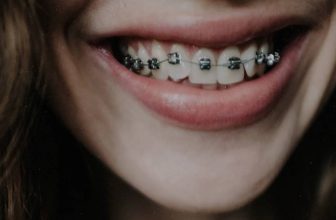Having braces can sometimes cause mild pain or discomfort, but this is only temporary and should go away within four days. You may also experience skin pain during the first week, but this is normal and shouldn’t last long. If you have any concerns, be sure to talk to your orthodontist.
How long do braces hurt when you first get them?
When you get braces, there is a good chance that you will experience some discomfort. Most people find that their mouth becomes sore, and they have a difficult time eating. The good news is that this pain typically goes away after a few days. However, if the discomfort continues for more than two weeks, be sure to speak with your orthodontist.
There are a few things that you can do to help minimize the pain associated with getting braces. First, take over-the-counter pain medication such as ibuprofen or acetaminophen. You can also use orthodontic wax to cover up sharp spots on your braces. Lastly, be sure to eat soft foods and avoid any chewy or hard foods that could irritate your mouth.

If you are experiencing discomfort after getting braces, rest assured that it is normal and will eventually go away. In the meantime, there are a few things that you can do to help ease the pain.
Why do you experience pain from your braces?
While braces may be uncomfortable initially, the benefits they provide are well worth it. Braces help to properly align your teeth, preventing future problems down the road. In addition, they can also help to improve your overall oral health.
Why do rubber bands on braces cause pain?
Orthodontists often add rubber bands to braces to apply additional pressure to your teeth. This pressure can be painful, but it’s only in the beginning. After a few days, your mouth adjusts to the extra stress, and the pain disappears.
When will you get used to them?
Braces can be uncomfortable when you get them, but it’s only for a month or so until you get used to them.
After six months, you won’t even notice that they’re there!
In the meantime, you might experience mild pain now and then. This is normal, and the pain will go away quickly. If it doesn’t go away or worsen, contact your orthodontist immediately.
10 Ways to Stop Pain From Braces At Home With Natural Remedies
If you are currently wearing braces, you know that the process can be a bit uncomfortable. This blog post will discuss eight ways to stop braces pain at home.
1. Eat Soft Foods
Are you looking for a way to enjoy good food without putting additional pressure on your teeth? Soft foods like mashed potatoes, noodles, and soup are perfect for the job! Plus, if you’re not sensitive to temperature, the cold can help reduce inflammation. Rewrite the content more engagingly, do not repeat it.

They are all soft and can help soothe your aching teeth. If you’re looking for something cold to drink, smoothies and cold drinks are perfect. And if you’re in the mood for some fruit, bananas and berries are both great options. Lastly, oatmeal is a good choice if you need some comfort food.
2. Use a Heating Pad
If you find that your braces are causing pain in your gums or cheeks, placing a heating pad on the area for 20 minutes can help. Just wrap the pad in a thin towel to avoid burns.
3. Rinse with Warm Salt Water
Rinsing your mouth with warm salt water several times a day can help reduce inflammation and kill bacteria that may be causing pain. To make the rinse, mix 1/2 teaspoon of salt in 8 ounces of warm water and swish it for 30 seconds before spitting it out.
4. Take Over-the-Counter Pain Medication
If you’re finding it difficult to cope with the pain, over-the-counter medication can help. Ibuprofen and acetaminophen are both effective at reducing pain and inflammation. Just be sure to follow the directions on the package.

5. Apply a Fluoride Treatment
Fluoride treatments can help reduce the risk of cavities, leading to pain. Your dentist can apply a fluoride treatment in the office, or you can purchase a kit to do it at home. Be sure to follow the directions carefully to avoid harming your teeth.
6. Use Topical Analgesics
Several topical analgesics can be applied directly to the gums to numb the pain. These products use different ingredients, so be sure to read the label carefully to find one that is safe for use with braces.
7. Wear a Mouth Guard
If you grind your teeth at night, it can cause pain in your gums and cheeks. Wearing a mouth guard can help protect your teeth and reduce the pain. You can purchase a mouth guard at most drug stores or online.
8. Ice Your Gums
If you’re looking for a way to reduce inflammation and get relief from pain, consider using ice packs. Place an ice pack in a towel outside your mouth for 20 minutes. The cold should help to reduce inflammation and provide pain relief.
9. Use Wax
If you’re struggling with irritated cheeks while wearing braces, orthodontic wax might be your solution. The soft barrier between your braces and mouth rest can help prevent cuts and irritation. Make sure to remove the wax before eating or brushing your teeth, then reapply when you’re done. And although you should avoid swallowing the wax, it’s non-toxic.
10. See Your Dentist
After trying these home remedies, you must see your dentist if you’re still experiencing pain. They will be able to identify the source of the pain and recommend additional treatment options.
We hope these tips help you find relief from your brace’s pain. Talk to your orthodontist if you have any questions or if the pain persists. They can offer additional suggestions on how to deal with the pain.







